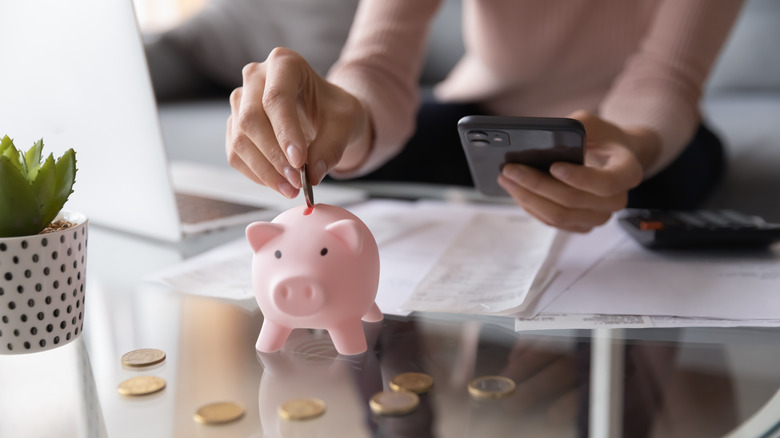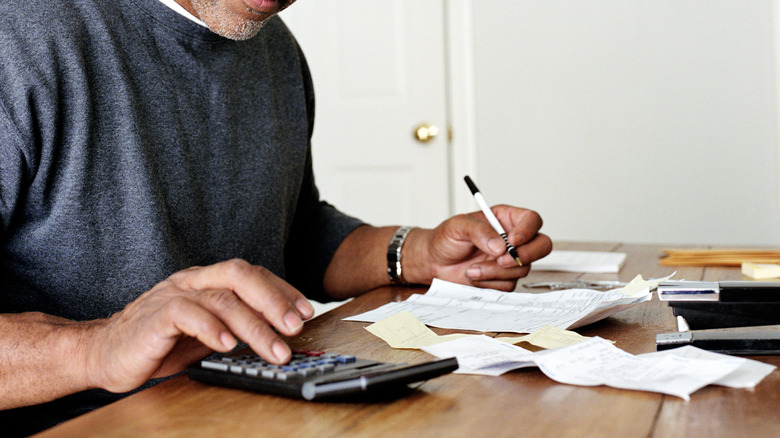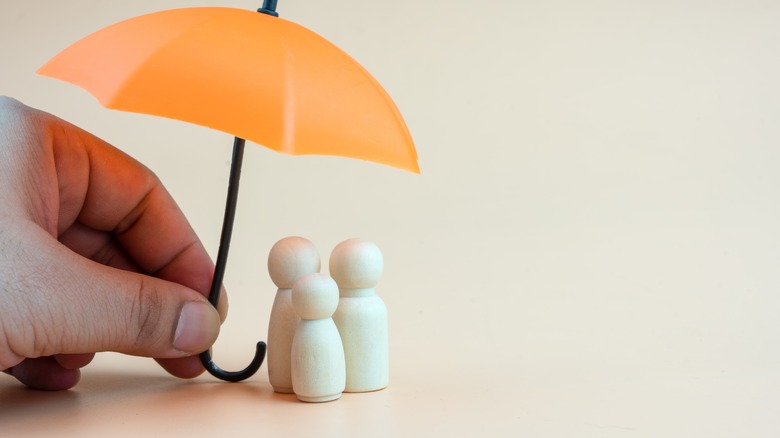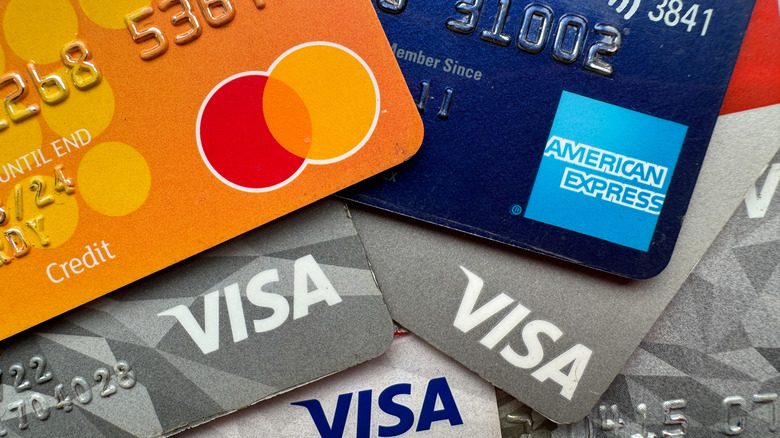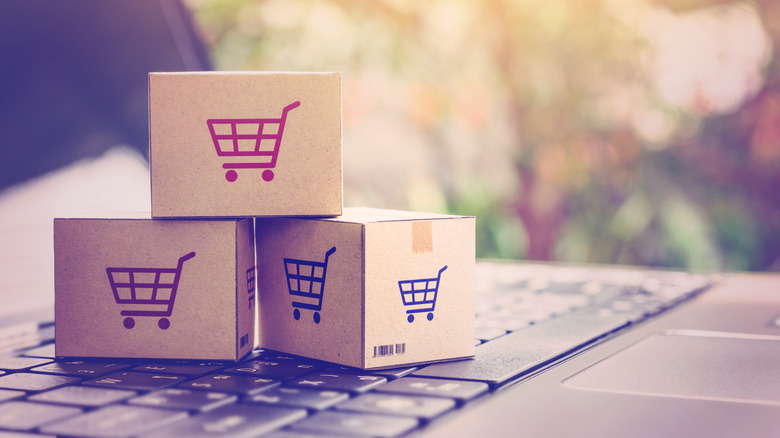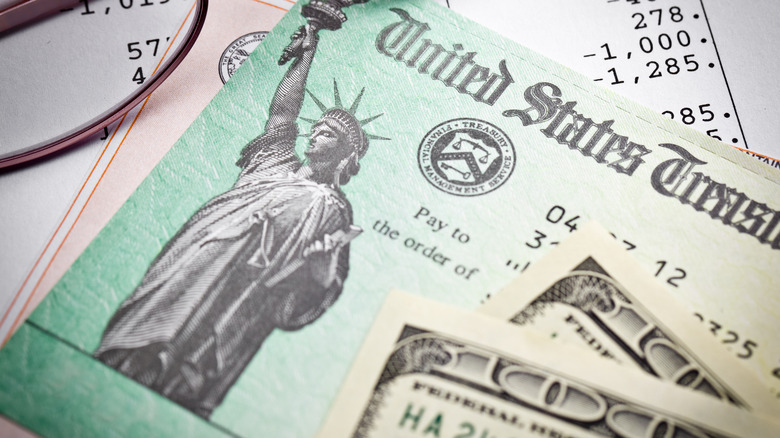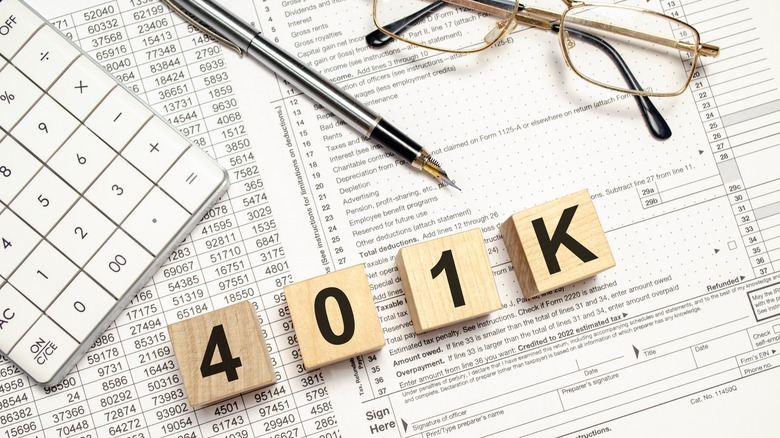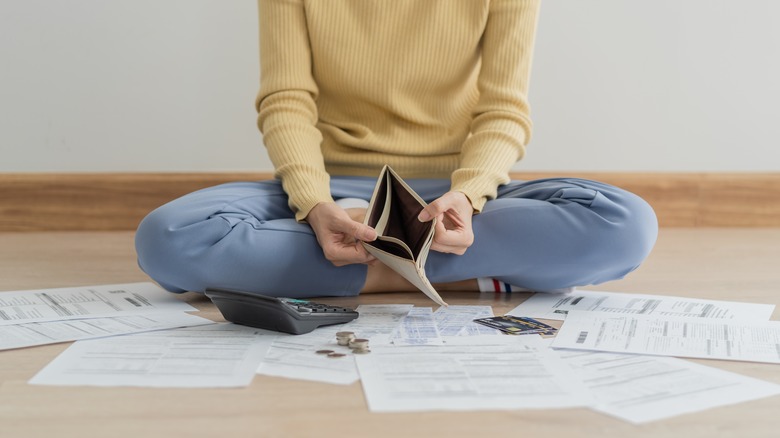Stop These Bad Money Habits Before You Go Broke
Money management is often a battle between good habits and potentially fraught spending desires. Creating positive financial forces in your life isn't about having help from a trusted advisor or getting lucky and starting your journey with wealth. You also don't need to have a great job or a sky-high salary to create positive momentum for your financial future.
The truth is that managing your money with intelligence is more about cutting out bad habits than introducing new streams of income, hitting it big in the stock market, or finally getting that promotion and raise you've been after. Anyone can create positive momentum for their finances, and all it takes is a little patience and dedication. Things like smart shopping while you're out buying groceries, or eliminating spending on things you don't use can make a world of difference in your finances. The best part is that these habits are easy to develop and increasingly snowball positivity into your money management processes.
The first thing you'll need to do to shirk bag financial habits is learn to understand that you don't know everything. Knowledge gaps can easily lead to bad decision-making, so seeking out answers and remaining hungry to learn and grow from your mistakes is the first step toward improved financial independence. With that in mind, these are some of the most important bad money habits that you should address right away.
Forgetting to budget
A budget is a financial plan that keeps you and your money heading in the right direction. While money isn't everything in life, it certainly makes for an easier time. Failing to budget is like setting off on a road trip to somewhere you've never been without a map and hoping for the best. In both finances and driving directions, you might still reach your destination, but it will take a lot of luck and will likely come with quite a few setbacks along the way.
Budgeting is the process of evaluating how much money you have coming in, and then calculating exactly what you intend to allocate to the various financial demands of your life. It acts as a fiscal roadmap to help you navigate the routine expenses you face, as well as unexpected financial requirements that may creep into the picture (such as replacing a flat tire or fixing a cracked phone screen). Creating a budget can feel like a daunting task. The execution of this financial planning tool can expose glaring holes in your money management, and that can be a scary thing. Yet, uncovering issues in your approach to personal finance also naturally helps you create a plan to solve any oversights that may exist. Sitting down and calculating how much you're spending on things each month is a powerful first step in any effort to rein in spending. If you aren't budgeting, you're leaving a valuable tool unused.
Eating out far too often
Restaurant meals are an important social activity. Eating out at a local restaurant helps stimulate your community's economy, and it can be a great way to spend time sharing important moments with friends or family. But eating out should be done sparingly. Restaurants are perhaps the single most expensive way to eat the essential calories you need daily. From a purely financial perspective, eating out at a restaurant or ordering takeout is maybe the worst way you can spend your hard-earned cash.
Avoiding social gatherings altogether isn't a great approach to this spending category, however. Humans are social creatures, and these kinds of interactions instill a sense of community and happiness in us. On the other hand, continuously ordering takeout meals or stopping in a drive-thru window on your way home from work to get a quick bite makes for an extraneous expense that can easily be cut out. Cooking for yourself can impart mental health benefits, and the improved quality of the food you're likely to be consuming also can add real value to your lifestyle beyond the reduced cost on your total food spend for the month.
Failing to develop emergency savings
Ideally, your emergency savings fund will hold three to six months worth of expenses. This is a good rule of thumb put forward by financial experts. This savings goal will ensure that you're fully capable of withstanding a seriously dislodging financial event like losing your job or getting injured and finding yourself unable to work for an extended period. Everyone's typical expenses will be different, so placing a dollar figure on emergency savings can be a bit tricky.
However, many Americans don't have any emergency savings at all, so a starting target of just $500 to $1,000 might make for a motivating and attainable goal that helps you balloon your emergency reserves. These funds will support you in the most dire of times, and prioritizing them can mean the difference between thriving and surviving when misfortune visits your doorstep. If you have to rely on a credit card or personal loan to cover a hospital visit or an emergency heater repair in the dead of winter, you may be paying for it for years to come as you struggle to maintain your ongoing expenses with that added payment on top. Putting cash aside to weather these scenarios isn't just a good idea, it's a truly essential budget element that can't be overlooked.
Relying consistently on credit card usage
Credit cards can be a hugely beneficial tool. They provide increased leverage for spending when you really need it. As well, rewards and cash-back credit cards offer a small return that can add up to a nice boost if you use them wisely. But, credit cards are some of the most expensive financial products you'll find anywhere in the market. The average interest rate at the end of 2022 was 19.77% annually, adding up to gigantic interest charges for anyone who doesn't pay off their card in full every month. Compared to a 12.45% interest rate on standard personal loans for borrowers with good credit in November of 2022, the discrepancy in added cost is clear as day.
Overreliance on credit card spending makes for a difficult financial road. Paying off credit cards naturally becomes more prescient than saving for the future — including adding to your retirement savings. Managing monthly payments eats away at the available cash you have on hand, often leading to an even deeper reliance on your credit accounts to make ends meet. The result is a cycle of debt that becomes increasingly difficult to get out from under.
Being cavalier with impulse spending
Impulse spending is a part of life. Stores, both digital and physical, take great pains to get you to purchase more stuff than you anticipated. From bundle offers to shelves right next to the cash register that entice you to pick up just one more thing as you wait to pay, impulse buying is a windfall for retailers. On the flip side of this relationship, it can represent a larger chunk of your available finances than you might expect. By the same token, buying something nice for yourself or a loved one after a tough week or month can be a generous act of kindness or self-care. However, engaging in the practice too often can leave you scrambling at the end of the month to manage the rest of your essential bills.
Placing impulse spending and added gift-type expenses at the tail end of your budget will give you something to work with in this regard, but will ensure that you healthily maintain them. It's also important to remain strong as you line up to pay for anything you're purchasing in a physical storefront. The temptation might be great, but sticking to only the things you need will make for much more manageable budgetary math.
Forgetting to add insurance coverage
Insurance products might seem like overkill in many circumstances. Renters might not even bat an eyelash at the thought of purchasing renter's insurance to protect their belongings. For some, protection like this might not make sense — for instance, if all the furniture in the property is your landlord's and you don't have any expensive jewelry or electronics. But this typically won't be the case. Homeowners insurance is a must-buy coverage that will protect your finances and home against the worst of luck and accidental damage. It will cost money every month, but the peace of mind that comes from knowing you won't have to fork over thousands of dollars to fix a foundation leak or damaged roof if the worst should happen is truly priceless.
Another essential insurance product is health coverage. Many young people shrug off the need to purchase health insurance, as they reckon they're in good health and can do without the added expense. But injuries and illnesses can happen to anyone, and at any time. Purchasing health insurance when you're well will allow you to eliminate any financial worries that might otherwise come into the picture if you might not be one day in the future. A hospital visit costs an average of $2,883 for just a one-day stay, and this can quickly add up to a ludicrously unmanageable figure for anyone finding themselves paying out of pocket after an accident or sudden health complication.
Grocery shopping without a list
Much like virtually all other retail locations, grocery stores are purpose-built to entice overspending. Grocery chains are dramatically better at this endeavor than the average storefront, however. First of all, with shrewd product placement, they force you to spend as much time wandering the aisles as possible. Staples like meat, dairy products, bread, and fruits and vegetables act as corner pillars of the shop floor, planted as far away from each other as possible. In the middle, shoppers run the gauntlet of bright and shiny consumer products that seek to feature as unplanned add-ons to their shopping cart.
If you go shopping without a coherent list of items that you need to buy, you're almost guaranteed to buy at least something that you didn't intend on picking up when you walked through the front doors. What's more, the longer you spend inside the grocery store, the lower your natural defenses against the onslaught of advertising and spending-boosting endcap design will be. Without a list, aimlessly walking back and forth is more likely as well, making for a longer stay and less focused shopping. Always prepare a list when you set out for the grocery store so that you don't fall victim to the tricks and traps of "Big Grocery."
Misusing your tax refund
Tax refunds are a big potential pitfall for consumers. Throughout the year, your paycheck is taxed, and then in April, the government finalizes its accounting of these tax records. For many Americans, this results in the realization that too much tax has been withheld by the government. This may be due simply to the fact that the standard deduction changes your tax obligation by a small margin, or as a result of a larger disparity between the withheld rate and the reality of your tax burden.
For a variety of underlying reasons, the average tax refund in 2023 was $2,753. For some, this is an extra cash infusion that makes for an ideal boost to purchasing power. But that's not the best use for your tax refund. Instead, putting your returned money into savings or using it to tackle ongoing debts can make for a long-term financial boost that makes a difference. If you've been struggling with credit card debt, for instance, a cash infusion of even $1,000 can go a long way toward making a sizeable dent in the repayments you owe each month. Not only will you tackle a chunk of the interest-bearing principal on the line of credit (reducing the amount of interest you're charged), but you'll also reduce the minimum you have to pay each month. Both of these factors rapidly speed up your road to total repayment.
Collecting subscription services
Subscriptions are everywhere these days. From food delivery services to streaming and gym memberships, American spend a considerable amount on a wide range of monthly services. On average, American consumers spend around $325 per month on TV and streaming services, gym memberships, music player accounts, and many others.
Yet, subscriptions often go underutilized, if not totally unused. Case in point, anyone who has subscribed to Disney+, Hulu, Netflix, and Paramount+ (not to mention the added streaming platform provided to Amazon Prime members) is likely paying for at least one more service than is realistically useful. The siloed-off content provided by competing streaming services makes for a good sales tactic to draw in more members, but oftentimes after you've finished watching a few shows on a new streaming platform you may unwittingly drift away from its use. The phenomenon is often spoken about when it comes to new gym memberships opened in January. Cutting out unused expenses in the subscription world can save you hundreds of dollars every year, money that can then be redirected to other pressing expenses.
Smoking
Smoking is not only bad for your health, but it's a costly habit that hits your wallet hard. The average price of a pack of cigarettes is as high as $12 in some states, with even the lowest average cost (found in Missouri) still rising above the $6 mark per pack. For routine smokers, this can quickly add up to a substantial financial drain that severely affects your ability to tackle other hobbies or provide for family members.
Quitting smoking isn't easy, but if you've been wanting to give up cigarettes, the reality that it can save you hundreds, if not thousands of dollars every year just might be the kickstart you've been looking for. Kicking the habit can bring about other positive side effects, too. If you successfully give up cigarettes, you can expect to enjoy better lung and heart health overall, potentially resulting in fewer doctor visits over the long term. Reducing your reliance on healthcare services will add another positive financial feature to your budgetary math, creating lasting positive momentum that opens up new avenues for savings or even alternative hobbies that enrich your life and add happiness to your days.
Avoiding essential repairs
A leaky pipe in your kitchen or a check engine light on the dashboard of your car might bring about terror for your financial balance, especially if you're experiencing a tight month (like December). However, failing to fix a small problem today can often lead to a much larger issue that requires immediate attention down the road. Inevitably, a small leak will turn into a larger one if you don't address it, and then not only will you have to deal with the leaky pipe but you'll also be forced to face off against rot, mold, or other forms of water damage that the once manageable trouble has added to your plate.
Even though it might be difficult to manage, getting small issues that will invariably grow into larger ones checked out and fixed while they remain minor troubles is something that should be high on your priority list.
Failing to save for the future
It's easy to think that retirement or other future financial goals are a long way off, and so they can therefore be tackled at a later date. When it comes to financial planning, however, the earlier you start putting money aside for a future goal, the harder your money will work for you. The power of compound returns means that time works enormously in your favor if you let it. In the same breath, if you leave savings needs too late, time can work against you as you race to meet a target in an abbreviated period. The world's wealthiest people start saving for future monetary needs years ahead of when they intend to spend the cash, and so should you.
If you aren't actively saving and thinking about your retirement or the purchase of your next house today, you may find yourself unable to make the leap from your current home or into the world of retirement from the workforce when you want to. You may never have the financial standing to accomplish these goals if you don't prioritize saving for them. Planning for your future needs is one of the most important things you can do for yourself, but it's all too often forgotten about because of all the time that seemingly separates the present from that distant future.
Bridging the gap with a payday loan
Payday loans were once big business in the United States. Payday loan companies were seemingly everywhere, and their advertising made it sound easy to get a cash advance on your next paycheck to help cover the cost of an emergency. But the reality of these niche lending products is that they came with astronomically high interest rates (sometimes as much as 1,900% APR!) because they were intended to bridge the gap between an expense today, and your next paycheck — perhaps just a few days away.
On paper, a payday loan seems like a decent way to get the cash you might need today, and then pay it back shortly after when your paycheck is deposited. But in practice, people who borrow with payday loans are increasingly likely to need another after they've spent their earnings on paying the lender back, including markups. The result is a cyclical relationship in which vulnerable consumers fall victim repeatedly to the most predatory lenders out there. The practice was such a vampiric one that John Oliver once ran a segment on them on "Last Week Tonight." It's truly never a viable option to use one of these kinds of lending products.
